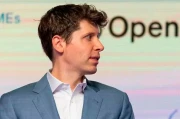So Satya Nadella logs onto X, the platform formerly known as the good one,...
2025-10-13 4 sam altman
When Sam Altman, the man at the helm of OpenAI, made headlines with the story that OpenAI CEO Sam Altman says he is 'envious' of Gen Z college dropouts who have the 'mental space' and time to build new startups - Fortune, the world tilted on its axis just a little. You could almost hear the collective gasp from university admissions offices everywhere. He wasn’t just making an off-the-cuff remark. He was sounding a trumpet, announcing the arrival of an era that many of us have only dared to whisper about.
This isn't just about one successful tech leader waxing nostalgic. It’s a signal flare. For generations, we’ve operated on a simple, iron-clad contract: go to college, get the degree, and then you’ll be granted permission to start building your life. That credential was the heavy, ornate key required to unlock the doors of opportunity. But what Altman, and a growing chorus of visionaries like Mark Zuckerberg, are realizing is that AI has just handed a universal skeleton key to every young person with a laptop and a spark of an idea.
The "incredibly wide" opportunity space Altman mentioned isn't just a new market or a new technology—it's an entirely new reality. It’s a landscape where the tools to build world-changing companies, once locked away in corporate R&D labs and elite university computer science departments, are now accessible through an API call. When I first heard him say it, I honestly just sat back in my chair, speechless. This is the kind of breakthrough that reminds me why I got into this field in the first place.
Let’s be clear about what this envy really means. It’s not about regretting success. It's about a master builder looking out at a field of freshly delivered, infinitely powerful LEGO bricks and mourning the fact that his own hands are already busy constructing a skyscraper. Altman’s feeling of his "mental space" being completely consumed by OpenAI is something he calls "a little bit sad," and I get it. He sees a Cambrian explosion of possibility, and he knows that the most agile, unconstrained minds are the ones best equipped to explore it.
Those minds belong to the young. The ones who aren't burdened by institutional dogma or the "right way" of doing things. Think about it: Sam Altman himself dropped out of Stanford at 19 to build Loopt. He lived this. He understands that the friction between a brilliant idea and its execution has never been lower. This is a fundamental paradigm shift—in simpler terms, the gap between having a thought and creating a functional product is collapsing into near-nothingness.
We’re seeing the ripples already. GV CEO David Krane shared that his own son, after a summer working in AI, started questioning if college was a "scam." A recent LinkedIn survey found that a minority of junior professionals—just 41%—now believe a degree is essential for a successful career. This isn't a rebellion; it's a rational response to a changing world. Why spend four years and a mountain of debt learning the theoretical foundations of a field that is being reinvented every six months?

The real question this forces us to ask is a deeply personal one: If the tools of creation are universally available, what is the new bottleneck? Is it capital? Is it connections? Or is it something much more fundamental—the audacity to imagine?
For centuries, universities have served as the revered gatekeepers of specialized knowledge. They held the maps, taught the languages, and conferred the credentials that allowed entry into the professional world. This model is not just being challenged; it's being rendered obsolete with breathtaking speed. This moment feels so much like the dawn of the personal computer, when visionaries like Steve Jobs and Bill Gates—both dropouts—saw that computing power didn't have to be a top-down, institutional resource. It could be a personal tool for creation.
Today, AI is the new personal computer, but on a scale that is almost impossible to comprehend. The speed of this is just staggering—it means the gap between a high schooler in Ohio with a brilliant idea for a biotech company and a PhD at MIT is closing faster than we can even process the implications.
This doesn't mean universities are useless. Far from it. But their role must evolve, and fast. They need to shift from being gatekeepers of information to being guides for wisdom. They should be incubators for curiosity, sandboxes for ethical experimentation, and communities for collaboration, not just conveyor belts for diplomas. With this immense new power to create, we desperately need a generation of builders who are grounded in ethics, who understand the societal impact of their work, and who are building for humanity, not just for profit.
What happens to society when the most powerful creative force in history is placed in the hands of those with the least to lose and the most to prove? What new forms of art, science, and business will be born when the only prerequisite is imagination?
So, let's stop framing this as "college versus no college." That’s an argument from the last century. This is about a fundamental shift in what it means to build, to create, and to contribute. Sam Altman's envy isn't a critique of education; it's a celebration of empowerment. It's the recognition that we are at the very beginning of a new renaissance, where the architects of tomorrow are not defined by the degrees on their walls, but by the worlds they dare to build. The starting gun has been fired, and the race is now open to everyone. It's time to start building.
Tags: sam altman
Related Articles

So Satya Nadella logs onto X, the platform formerly known as the good one,...
2025-10-13 4 sam altman